Summer Fellows Make a Difference in Maine
By Tom PorterMore than forty students received funding through the McKeen Center for the Common Good and the Environmental Studies (ES) Program over the summer to work for local government and nonprofits that are protecting the environment and helping improve people's lives throughout the state of Maine.
Both of these campus offices run large internship and fellowship programs to give students workplace experience in mission-driven organizations.
The McKeen Center oversees four internship initiatives, three of which provide opportunities in Maine: The Maine Community Fellowship and the Maine Government and Lee Lockwood Fellowship, a part of the Bowdoin Public Service Initiative, explicitly focus on the state, while the Denning Summer Fellowship often ends up funding a cohort of students who also want to work in Maine. (The fourth program is the Global Citizen’s Fellowship.)
This summer, the ES Program supported students through several dedicated funds, including the Kappa Psi Upsilon Environmental Studies Fund, the Logan Environmental Studies Internship, the Poppy Environmental Studies Fellowship Fund, and the Cooke Student Research Fund.
Twenty-eight students pursued fellowships through the McKeen Center programs, while fifteen were environmental studies fellows.
The administrators of all Bowdoin's Maine-based internships recently invited students to share their experiences at a poster presentation in Morrell Lounge. Staff and faculty attended, as well as many of the nonprofit supervisors and civic employees.
Below is a sampling of some of the projects that were highlighted.
Environmental Studies fellows:
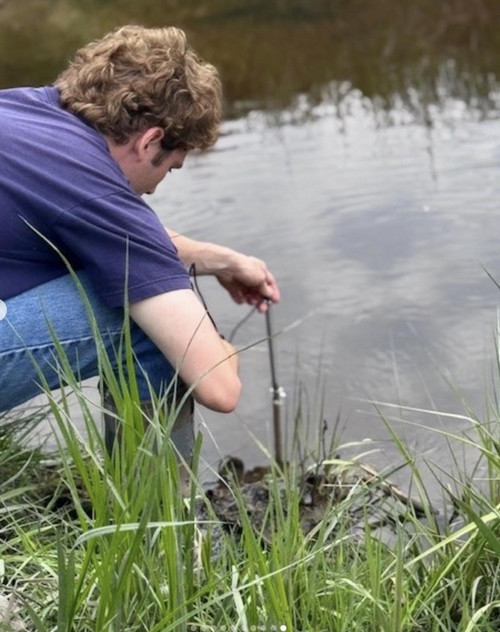
Photo: D. Devereaux, Town Coastal Resources Manager.
Henry Doerr ’26 worked at the Town of Brunswick’s Environmental Planner’s Office.
The office is dedicated to protecting the natural resources of Brunswick and building a healthy and sustainable future for the town, said Doerr, who spent much of the summer helping to implement the planning office’s Mare Brook Watershed Management Plan. Mare Brook is a 5.7-mile stream, he explained, with a 4.9-square-mile drainage area, all located within the town limits, making it an invaluable ecological resource playing a vital role in the town’s environmental health.
“My work has included conducting public outreach to residents living near Mare Brook, meeting with nonprofit partners like Trout Unlimited, and researching the ecological benefits of strategic wood additions—an approach that involves placing woody material directly into the stream channel to improve habitat.”
The environmental studies and history major has also been helping the town update its 2005 pesticides and fertilizers ordinance, researching how other towns have approached the issue.
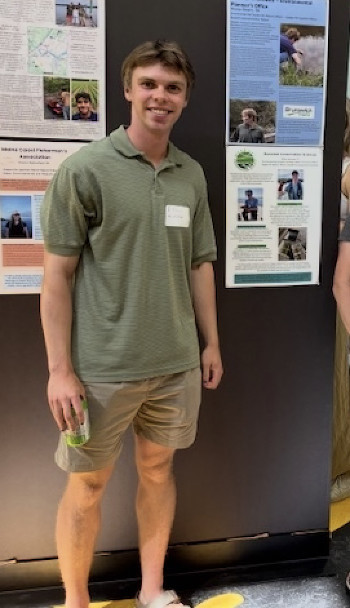
Ethan Hatcher ’27 worked with Manomet Conservation Sciences.
The ES and math major spent the summer with the Manomet fisheries team, trapping blue and green crabs with community partners at Bowdoin’s Schiller Coastal Studies Center in Harpswell and Madeleine Point Oyster Company, which is in Yarmouth. The data collected on invasive green crabs will be used to determine their effect on eelgrass beds, while the blue crab data will determine their population dynamics and work toward a potential new fishery, said Hatcher.
He also partnered with the town of Brunswick to work on the cleaning and measuring of quahogs, a type of hard-shell clam. This research, he said, will help determine the most economically viable ways of cultivating quahog seed for stock enhancement.
Hatcher said the fellowship, which gave him the opportunity to review national and state-level shellfish regulations, provided him with an incredible introduction to fisheries research. “I gained valuable experience in fieldwork, policy review, and data analysis, and I have had the opportunity to meet so many interesting community partners and engage deeply with the problems we face in the Gulf of Maine.”
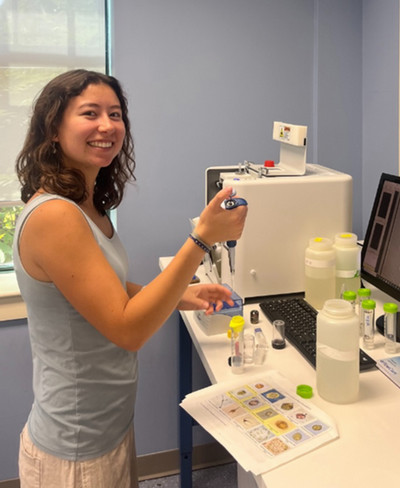
Hazel Johnson ’26 did her fellowship with the Maine Coast Fishermen’s Association, funded by the Maine Coastal Program and Marine Climate Action.
This summer, Johnson focused on the expansion of black sea bass (Centropristis striata) into Maine. It was part of a collaborative science project involving advocacy groups and fishermen working together to create a survey to gather data on the Maine black sea bass population.
Johnson, who grew up in coastal Maine and is majoring in ES and biology, said input from local harvesters, including some of her own relatives, was a key part of the initiative. “I enlisted the lobstermen in my family to test out the black sea bass survey.” Using the collected data, Johnson mapped the fish locations and measured their size with a software program called ImageJ.
The project also gave Johnson the opportunity to complete a short course in ArcGIS, where she learned to create maps and storymaps, and applied these skills to MCFA projects. “I attended a working waterfront workshop, the Portland Fish Exchange, and a New England Fisheries Management Council meeting. These events demonstrated the wide range of essential work involved in supporting Maine fisheries.”
McKeen Center Programs:

Grace Chang ’27 pursued a Maine Community Fellowship, with Hope Acts, a nonprofit offering assistance to asylum seekers.
The organization provides access to housing and other basic needs, helps asylum seekers navigate complex immigration processes, and provides resources for learning English to help them successfully transition to a new life in Maine.
During her time at Hope Acts, Chang was involved with the Asylum Seekers Assistance Program (ASAP) and assisted with work permits. “I have helped clients complete and mail out change of address forms, Free Care, SNAP, and EBT [electronic benefit transfer] applications and supported them in understanding immigration documents, with the help of our amazing volunteers, who assist with interpreting,” said Chang, who is majoring in psychology.
Chang has also used her fellowship experience to undertake an independent research project investigating mental health resources for Maine’s asylum-seeking population.
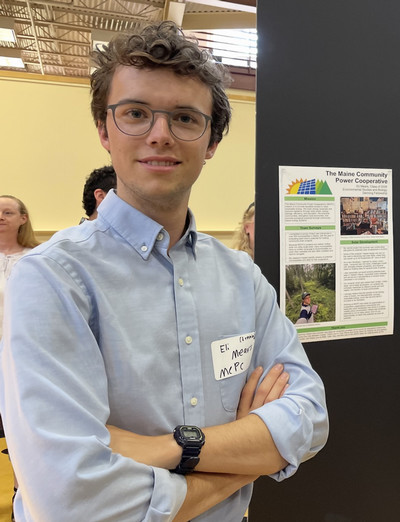
Eli Mears ’26 undertook a Haley Denning Fellowship at the Maine Community Power Cooperative, which aims to provide equitable access to clean renewable energy.
The group’s mission involves lowering energy expenses and improving resiliency through solar power, energy storage, efficiency, and education.
Over the summer, Mears completed a survey of land use ordinances in over 300 municipalities in Maine with the goal of evaluating each town's potential for hosting community solar projects. His research helped identify dozens of potential municipalities and sites for the cooperative.
Mears learned how to use ArcGIS software during his fellowship, enabling him to work on constructing site plans for several solar development projects, some of which are now on the way to becoming real solar fields. These can power up to fifty households off one acre of land!
“Our projects’ small size makes them nimble,” said the ES and biology major. “Unlike those of large out-of-state developers, our projects are minimally restrained by Maine’s power grid and helpful, not harmful, to local communities.
“I strongly believe that the solution to the energy crisis is locally not internationally sourced renewable energy, much like the kind MCPC provides to its members.”
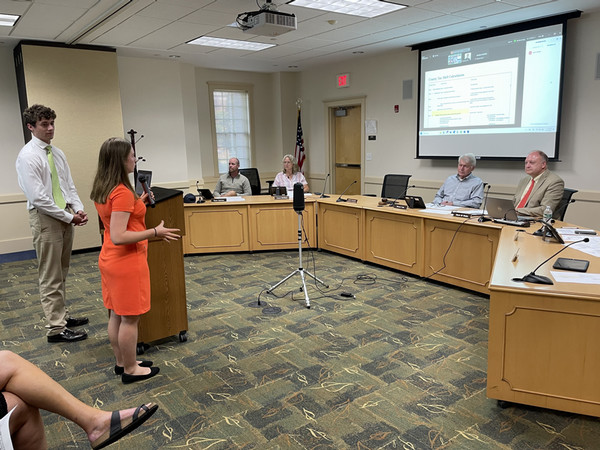
Amaya Nicklas ’26 undertook a Bowdoin Public Service (BPS) Maine government fellowship at the Topsham town manager’s office.
Nicklas worked on a project involving a number of issues, including battery energy storage systems, the sale and licensing of adult use cannabis, and waste disposal and recycling.
“I have enjoyed the opportunity to spend time with multiple departments of Topsham's government,” the government and philosophy major reflected, “from riding along in the fire truck to measuring the dimensions of a new development with the assessing office to turning compost at the transfer station.”
She also enjoyed a deep dive into the world of tax increment financing (TIF)—a public financing tool used by municipalities to promote development. Nicklas joined a team exploring the costs of creating a TIF district to promote an affordable housing project, and assessing the value this would bring to the town. “It was interesting to explore the tension between the need for housing, the high cost of building materials, and the true cost to Topsham of granting TIF districts.”
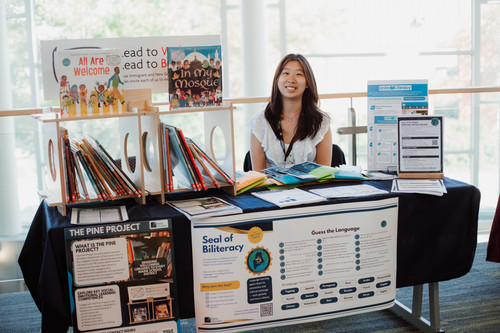
Bobin Park ’28 completed a BPS Maine Government and Lee Lockwood Fellowship at the Maine Department of Education.
Her role at the DOE centered around the Seal of Biliteracy, an award that honors graduating high school students who demonstrate proficiency in two or more languages. As a multilingual learner herself, Park said she wanted to ensure more students could get recognized for the language they speak at home.
During her internship, Park focused on creating a resource kit that would make the seal accessible for all students.
She also found ways to market the many benefits of the seal, and multilingualism more generally, in the state of Maine. “Through this process, I talked to employers, college admissions offices, high school teachers, and students to expand recognition of the seal and motivate many more to apply for it,” she said.
In gathering data for her research, Park found that nearly 83 percent of high school seniors who graduated with the Seal of Biliteracy enrolled in a four-year college, compared to around 60 percent of non-Seal of Biliteracy recipients.
Below is a sampling of posters from other student summer fellowships:
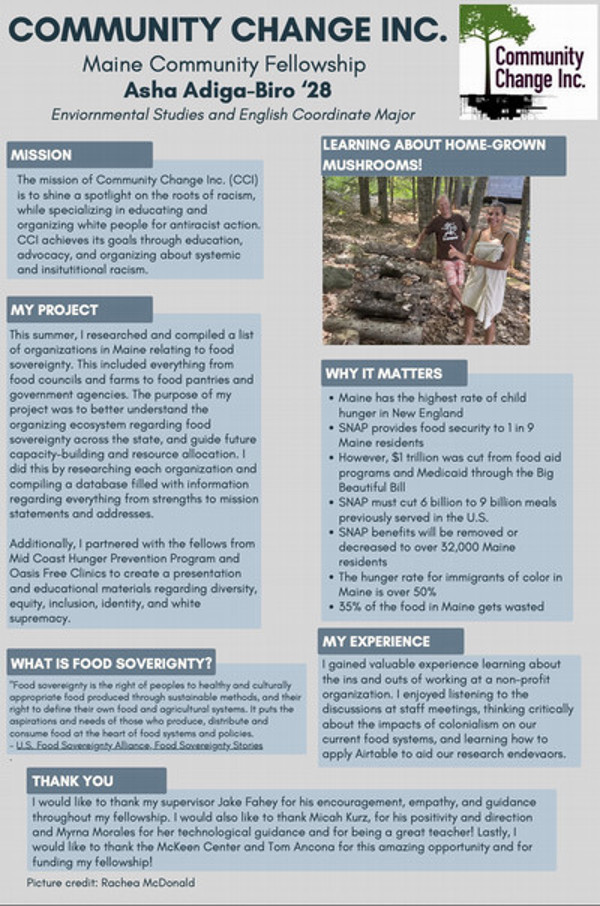
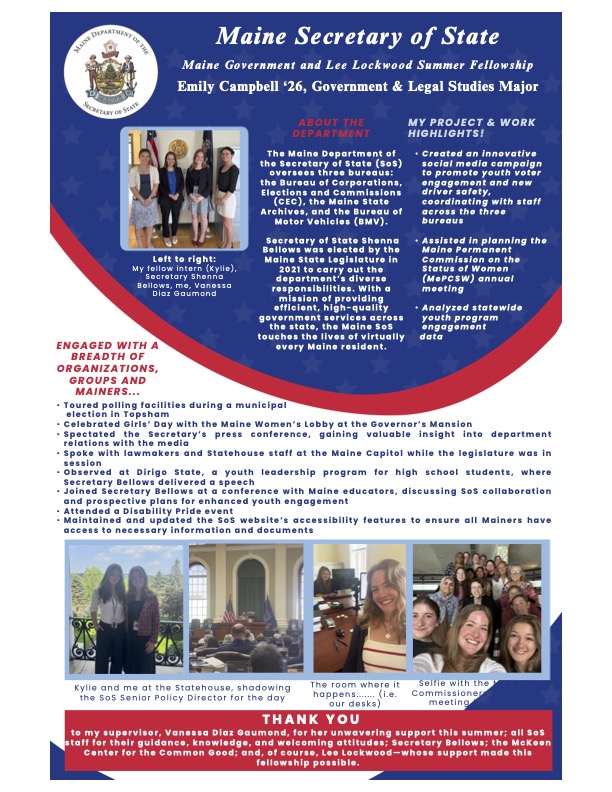
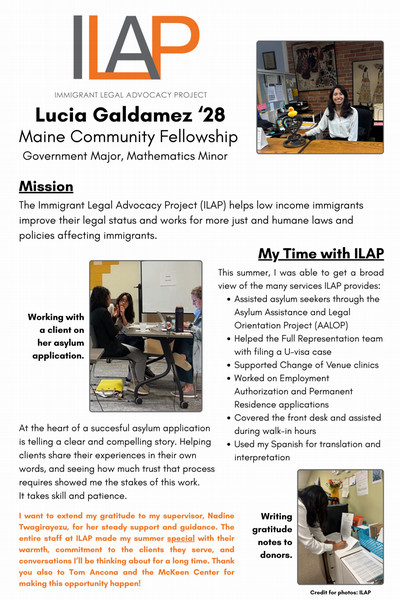
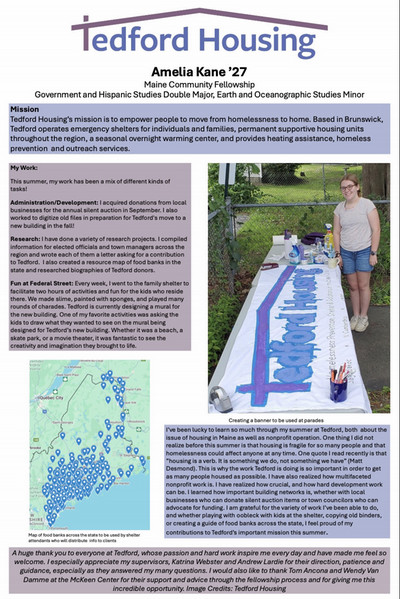
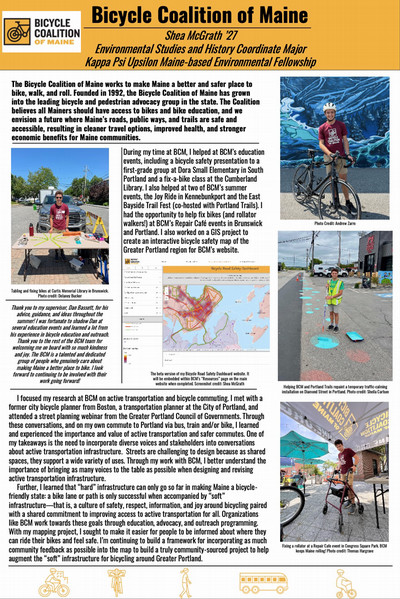
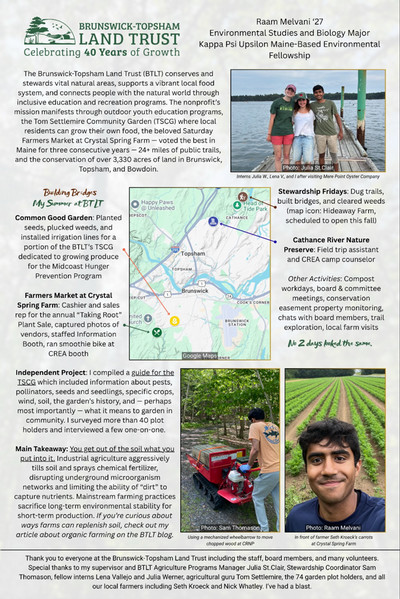
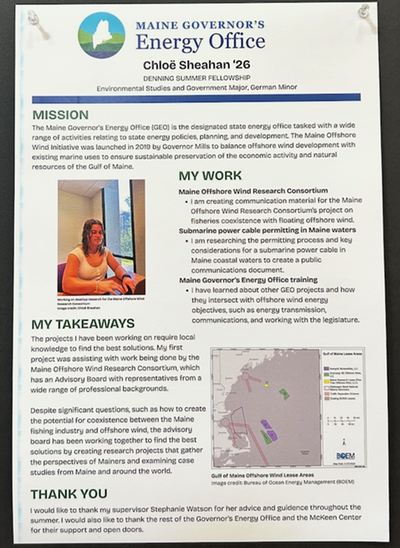
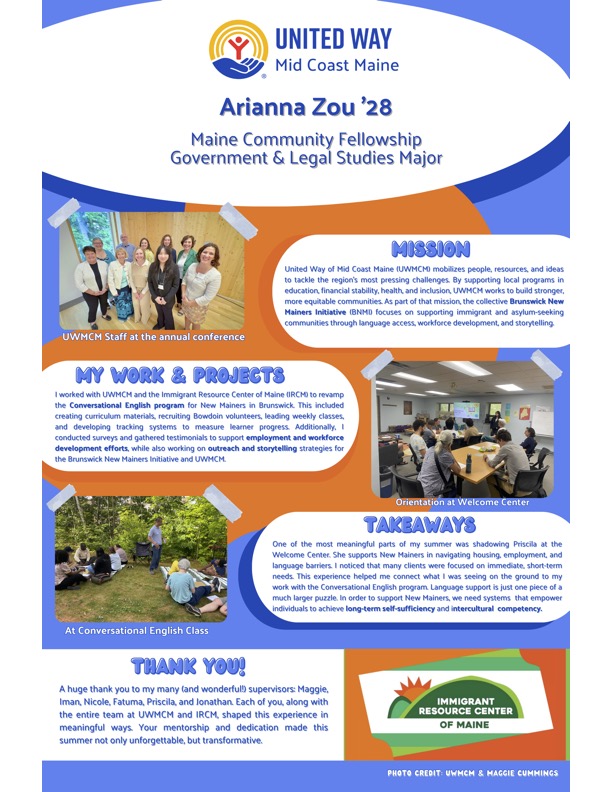








Generous donors support a number of McKeen Center and environmental studies student fellows each year. Special thanks to the donors of the Davidson Fellowship, Denning Fellowship, Kappa Psi Upsilon Environmental Studies Fund, Lee Lockwood Fellowship, Logan Environmental Studies Internship, Hayes Foundation Fund for the Environment, and Poppy Environmental Studies Fund.